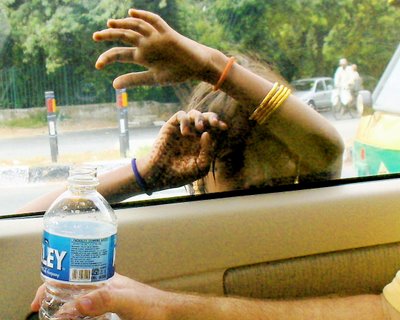 Tap, tap, tap, Old Delhi, India, August 2006, HP Photosmart R817, Exposure 1/160 sec @ f2.8, ISO 180, no flash © Steven Crisp [Click on the photo to enlarge]
Tap, tap, tap, Old Delhi, India, August 2006, HP Photosmart R817, Exposure 1/160 sec @ f2.8, ISO 180, no flash © Steven Crisp [Click on the photo to enlarge]Your attention is focused on the road ahead — you need to navigate all manner of vehicles and pedestrians, going in just about every direction. And then as you slow down for an intersection, your attention is shifted from the windshield to the “tap, tap, tap” on one (or more) of your passenger windows. You imagine the request: “Hey Mister Westerner, how about some change for me? For my family? Please?” It was hard for this girl to see into our car, since the windows were darkened. So she stuck her nose up to the glass and tried to see inside, as well as to make herself known.
This is Old Delhi — a spider’s web of streets overlaid on a predominantly Muslim population. (India also has the 2nd largest number of Muslims in the world.) We had been advised earlier not to roll down our windows to provide any money, nor to buy from the street vendors hawking cheap trinkets and eager to test out their English in hopes of a few rupees. “If you give to one,” we are told, “they will quickly engulf the car.” A very strange situation. Do you look? Do you ignore? Do you try to help anyway? What would you do?
This situation is surely not the most grim in the world, but at the same time, it is unmistakable material poverty. It makes me think of this quote from Martin Luther King, Jr.:
I have the audacity to believe that people everywhere can have three meals a day for their bodies, education and culture for their minds, and dignity, quality, and freedom for their spirits. I believe that what self-centered men have torn down, other-centered men can build up.And what is it that makes me see beauty even here? What else ... our humanity. If you do not see, how will you be moved to consider this situation —- to decide what, if anything, you would like to do about it. Perhaps only accept it. Perhaps only be present for the suffering, for the stark difference in material wealth in the world. Perhaps only to wish for something better. Or perhaps to consider the current realities and expect something better for our humanity. And then perhaps to take one step -— one beautiful step -— to acknowledge, to understand, to feel compassion, and to move us upward, collectively upward, as we are most certainly capable of doing.
-- Martin Luther King Jr.
I see beauty in that potential -— in that intention. Don’t you?
Intention is the core of all conscious life. It is our intentions that create karma, our intentions that help others, our intentions that lead us away from the delusions of individuality toward the immutable verities of enlightened awareness. Conscious intention colors and moves everything.
-- Master Hsing Yun, Describing the Indescribable
2 comments:
I see my sister and her poverty, and wonder what choices are mine to make that will aid in the healing of a world that has brought about such disparity of wealth. Yes, the healing begins with myself and we all have our own healing work to attend to. Yet that is not enough. She is my sister and she is begging.
Compassion, a variation of love. Is it a feeling? Or is it a verb?
How close to home, Pat.
It reminds me of the Pay It Forward movie, where one of the protagonist's mother was homeless and living on the street. What do you do? It is due in part to their own choices; and yet it seems unconscionable.
But of course, one action is to Pay It Forward. To offer our help in some way to a few unsuspecting souls, with the hope that such kindness/compassion would be returned -- not to you -- but "paid forward" to others in need.
And by this act, that kindness, compassion, and unconditional love might spread like a virus of help and of hope, and infect more and more of humanity, until we all know of someone that has fallen victim to its spell, and then one day, everyone has finally succumbed.
But the whole point of the Pay It Forward concept is that you do not measure progress by how many people have passed on the kindness gene. The yardstick is so much simpler. One need only ask, have *I* passed it on yet? If not, what am I waiting for.
Post a Comment